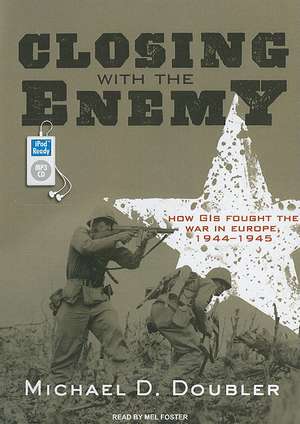Closing with the Enemy: How GIs Fought the War in Europe, 1944-1945
Autor Michael D. Doubler Mel Fosteren Limba Engleză CD-Audio – 31 aug 2010
Closing with the Enemy picks up where D-Day leaves off. From Normandy through the "breakout" in France to the German army's last gasp in the Battle of the Bulge, Michael D. Doubler deals with the deadly business of war-closing with the enemy, fighting and winning battles, taking and holding territory. His study provides a provocative reassessment of how American GIs accomplished these dangerous and costly tasks. Doubler portrays a far more capable and successful American fighting force than previous historians-notably Russell Weigley, Martin Van Creveld, and S. L. A. Marshall-have depicted. True, the GIs weren't fully prepared or organized for a war in Europe and have often been viewed as inferior to their German opponent. But, Doubler argues, they more than compensated for this by their ability to learn quickly from mistakes, to adapt in the face of unforeseen obstacles, and to innovate new tactics on the battlefield. This adaptability, Doubler contends, was far more crucial to the American effort than we've been led to believe. Fueled by a fiercely democratic and entrepreneurial spirit, GI innovations emerged from every level within the ranks-from the novel employment of conventional weapons and small units to the rapid retraining of troops on the battlefield. Their most dramatic success, however, was with combined arms warfare-the coordinated use of infantry, tanks, artillery, air power, and engineers-in which they perfected the use of air support for ground operations and tank-infantry teams for breaking through enemy strongholds. Doubler argues that, without such ingenuity and imaginative leadership, it would have been impossible to defeat an enemy as well-trained and heavily fortified as the German army the GIs confronted in the tortuous hedgerow country of northern France, the narrow cobblestoned streets of Aachen and Brest, the dark recesses of the Huertgen Forest, and the frigid snow-covered hills of the Ardennes. Marking the fiftieth anniversary of the American victory in the Battle of the Bulge, Doubler offers a timely reminder that "the tremendous effects of firepower and technology will still not relieve ground troops of the burden of closing with the enemy." As even Desert Storm suggests, that will likely prove true for future high-tech battlefields, where an army's adaptability will continue to be prized.
Preț: 147.63 lei
Nou
Puncte Express: 221
Preț estimativ în valută:
24.93€ • 25.93$ • 20.89£
24.93€ • 25.93$ • 20.89£
Indisponibil temporar
Doresc să fiu notificat când acest titlu va fi disponibil:
Se trimite...
Preluare comenzi: 021 569.72.76
Specificații
ISBN-13: 9781400169498
ISBN-10: 1400169496
Dimensiuni: 135 x 193 x 14 mm
Greutate: 0.12 kg
Ediția:Completă
Editura: TANTOR MEDIA INC
ISBN-10: 1400169496
Dimensiuni: 135 x 193 x 14 mm
Greutate: 0.12 kg
Ediția:Completă
Editura: TANTOR MEDIA INC
Recenzii
"This important book is a watershed in critical thinking.... Fluently written and beautifully detailed, it is essential for a complete understanding of American operations in World War II. Highly recommended for public and academic libraries." ---Library Journal Starred Review
Notă biografică
Lieutenant Colonel Michael D. Doubler serves in the office of the Chief of the National Guard Bureau, Headquarters, Department of the Army, Washington, D.C. He received his Ph.D. from Ohio State University and has taught at the U.S. Military Academy at West Point. Mel Foster has narrated over 150 audiobooks and has won several awards. Twice an Audie finalist for 1864: Lincoln at the Gates of History by Charles Bracelen Flood and Finding God in Unexpected Places by Philip Yancey, he won for the latter title. He has also won several AudioFile Earphones Awards. Best known for mysteries, Mel has also narrated classic authors such as Thoreau, Nabokov, and Whitman.
Descriere
Closing with the Enemy reveals that, contrary to the popular view that U.S. troops prevailed in Europe during World War II simply because of a preponderance of material resources, American GIs actually learned, adapted, and innovated their way to victory.
Textul de pe ultima copertă
'Unflinchingly objective. Doubler makes a convincing case for seeing the GI as an amateur who learned quickly and well and who, by the end of the war, had turned himself into a formidable enemy.' -- John Keegan in the Washington Times








